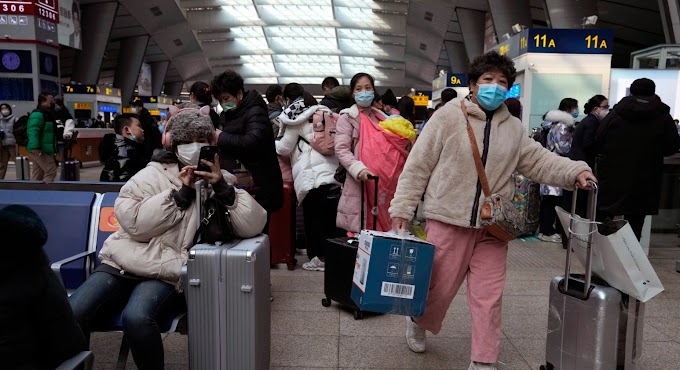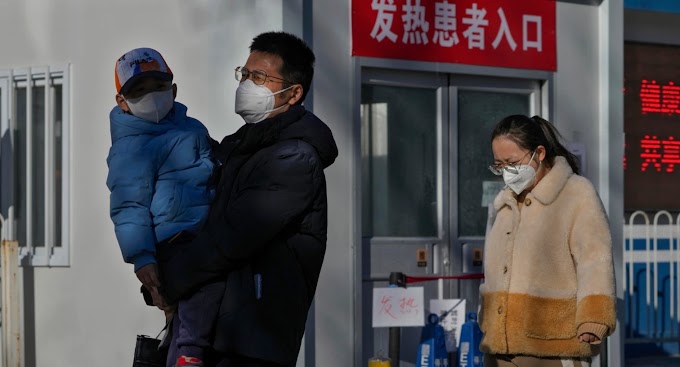Japan may join the U.S. chip ban, and China's advanced chip research and development may suffer a severe setback
 |
| Semiconductor chips assembled at new nanoelectronics manufacturing center in Brooklyn, New York, USA |
TAIPEI-
The World Trade Organization (WTO) confirmed on December 15 that China had lodged a complaint against the US chip export restrictions. But experts believe that the U.S. camp to suppress Chinese chips is growing, and Japan may also join. However, China will be affected by the ban on high-end chip technology, and Japan will face the challenge of operating limited options under the US-China strategy.
Japan's accession to China ban has strategic significance
The World Trade Organization confirmed on December 15 that China had lodged a complaint against the United States' chip export restrictions, accusing the United States of threatening the stability of the global supply chain. In this regard, the United States insists that its export restrictions are in the interest of national security.
The Biden administration announced in early October this year the most comprehensive chip export control measures against China over the years, and actively wooed Taiwan, Japan, the Netherlands, and South Korea to join the anti-China camp.
"Kyodo News Agency" quoted sources on December 10 as saying that US Secretary of Commerce Raimondo had a telephone conversation with Japanese Minister of Economy, Trade and Industry Yasutoshi Nishimura on December 9 and asked Japan to respond to US chip control measures against China. It is reported that this is the first time that Japanese and US ministerial officials have directly requested cooperation.
"Bloomberg" reported on December 12 that the United States has successfully persuaded Japan and the Netherlands to jointly control the export of Chinese semiconductors. It is reported that the two countries of Japan and the Netherlands will announce in the next few weeks that they will implement some of the chip bans imposed by the United States in October.
Dr. Xu Wenfu, former convener of the science and technology group of the Taiwan Professors Association and market consultant of the French power system manufacturer SAFT, pointed out that from 2021 to 2023, 84 new wafer factories will be built around the world, with an investment of up to 500 billion U.S. dollars, of which the U.S. There are 18 fabs, and China has 20, but China's fabs are different from the high-end technologies below 20 nanometers invested by the United States and other countries.
He told Voice of America: "The production equipment of semiconductor fabs in the world mainly comes from three countries. The first is the United States, the second is the Netherlands, and the third is Japan. The current ban from the United States will Their country’s semiconductor equipment was banned from China, and then the Netherlands followed suit, and Japan should follow suit. So even if China’s semiconductor factories will build 20, they are all mature processes with low gross profits. The more advanced processes are all Like in the United States, Taiwan, Japan, and South Korea. Therefore, it is of great strategic significance for Japan to join hands to ban the export of advanced process equipment to China."
Dr. Satoshi Tachibana, an expert in international management and founder of Wheelis Japan Consulting It is believed that at the macro level of the country, it is the subjective desire of politics to dominate the economy. For example, after the outbreak of the Russo-Ukraine War, most countries in the European Union had to sacrifice their economy and follow up sanctions against Russia in order to follow the United States and to be politically correct.

Satoshi Tachibana told Voice of America: "Japan's semiconductor industry has lagged behind Taiwan and South Korea. Japan's participation in the sanctions actually suffers little economic loss. Therefore, it is better to push the boat with the tide and win a few more points politically. Why not? No reason? At the same time, the United States is also aware of this point. The United States also has great political and symbolic significance. Japan is the leader of the Western camp of the United States in the East, so it must join the sanctions, otherwise, the United States will lose face."
Tachibana Satoshi said that even if Japan does not join the chip sanctions, it will not get important benefits from China. Therefore, it is impossible for Japan to fall to China and fully oppose the United States. He believes that if Japan does not join the chip sanctions this time, the result will be unfavorable to both sides, making people inside and out.
In an interview with Voice of America, Lu Xinji, executive director of the Japan-Korea Research Center at Chung Hsing University in Taiwan, said that Japan's participation in the sanctions represents support for the US sanctions policy under the hegemonic trading system led by the US. As long as Japan has a certain industrial proportion in this industrial chain, it will have its importance.
He said: "There is actually no direct logical relationship between the United States and Japan's re-establishment of Japan's role in its semiconductor industry chain and Japan's relatively insignificant role in the past. If the information from foreign media is correct, it is more important. What is more relevant is whether the United States, Japan and the Netherlands will jointly block the proportion of the semiconductor supply chain they own in the future, or whether they have key technologies, or whether they have confidential technologies. This is what Japan has after joining the sanctions. It is the basis for the key evaluation of nature.”
Japan’s policy announcement may be a bargaining chip in the negotiation with China
Kyodo News reported on December 10 that if Japan imposes similar export control measures on China, it will inevitably trigger a strong backlash from Beijing, which may make it difficult to achieve specific policy cooperation between Japan and China.
Lu Xinji, executive director of the Japan-Korea Integrated Research Center of Chung Hsing University in Taiwan, said that Beijing's strong backlash must be considered in Japan's options for whether it is willing to cooperate with the US sanctions plan, and it is impossible to simply judge which side Japan is leaning on in its strategic choices. In dynamic international trade negotiations, Japan can even declare its current policy as a bargaining chip with the next party.
Lu Xinji said: "On the whole, in pure international trade, Japan must be able to estimate the profit-loss ratio between the cost and the income. But how to properly operate the options under the US-China strategy, such as policy announcements that favor the US Sanctions policy, but in fact through other subsidies or reinvestment policies to avoid harsh criticism from the Chinese side, what is more, losses in short-term trade, and in exchange for a more medium-term and long-term political commitment, are all Leaders and leadership teams must think about it under the pressure of ruling policies and the international system."
Lu Xinji pointed out that if the policy cooperation between Japan and China is difficult to achieve, what can be exchanged for is a closer cooperative relationship with the United States, which may cause the Japanese government to turn around.
Dr. Xu Wenfu, the former convener of the Science and Technology Group of the Taiwan Professors Association, believes that it is inevitable for the Japanese government to offend China in the joint research and development plan with the United States based on political factors.
He said: "The biggest reason is that the United States and Japan are about to conduct joint research and development of next-generation semiconductor infrastructure equipment. This plan will enable Japan and the United States to cooperate in the development of two-nanometer process technology. The funding for this is rumored It may be as high as 350 billion yen. This part is the main reason why Japan's semiconductor industry or the Japanese government needs to guide the semiconductor competition between China and the United States. In addition to this part, the United States and Japan will also have more diplomatic, military, and even The political combination is in response to the direction of Japan's more advanced plan to prevent China's semiconductor industry from joining the ranks of the United States and the Netherlands."
Xu Wenfu pointed out that China's appeal to the World Trade Organization regarding the US ban should have no effect, because the US issued the ban based on national security reasons, and Japan will inevitably put national security issues above Japan-China economic cooperation.
Dr. Satoshi Tachibana, an expert in international business management, said that capitalism is a free market economy, so it is difficult for politics to completely control the economy. China is a one-party dictatorship, so the "clearing" policy can last for a long time, but other democratic countries cannot. For example, Japan's ruling party, the Liberal Democratic Party, is under pressure from the corporate and financial circles. Democratic countries have elections, and the economy will counteract politics.
He said: "What is the United States doing now? It is using the 'visible hand' to control the 'invisible hand'. Can it be controlled? It may be possible to control some, but not all; it may be possible to control In the short term, we can’t control the long term. We often say in mainland China that there are policies and there are countermeasures. In fact, it is the same everywhere in the world. Politics should dominate the economy. If that is against economic principles, there will be a rebound at the economic level.”
Tachibana Satoshi pointed out that even the CCP could not stand the economic pressure and gave up the complete "clearing" policy in the end, so it is hard to predict how long the chip control in the United States can last.
Japanese experts doubt the effectiveness of the ban
The British "Financial Times" reported on December 10 that senior Japanese technicians believe that the US chip ban on China will not be very effective.
It is reported that Hiroaki Kitano, head of technology at the Japanese company Sony (Sony), believes that the US chip sanctions against China will only temporarily affect China's procurement of chips, but it will not curb China's growth momentum in the field of artificial intelligence. He also believes that the US's export restrictions on semiconductor products and devices will not have a long-term impact on China. The president of NEC, Takayuki Morita, also has the same doubts. He believes that the blockade of Chinese semiconductors may weaken China's chip research and development capabilities in the short term and prevent the People's Liberation Army from easily obtaining advanced semiconductors for military use. But it can only achieve short-term restrictions, and it is difficult to continue to restrict China's semiconductor development in the long run. Morita Takayuki said that the Chinese government is vigorously developing semiconductors, making Chinese semiconductor companies more and more competitive.
Dr. Xu Wenfu, the market consultant of SAFT, a French power system manufacturer, said that China has invested as much as 850 billion yuan in the development of its semiconductor industry, and the growth rate is indeed impressive. The chip ban issued will severely setback China's semiconductor technology improvement.
Xu Wenfu said: "It is true that China's full investment in funds has also allowed China's semiconductors to grow from zero to one-third of the current level, but if we want to go to advanced manufacturing processes, we must import them from the United States, the Netherlands, and Japan. Some very advanced equipment. Therefore, China is indeed facing an impossible challenge in the development of advanced manufacturing processes. Even if China devotes all its efforts, it will be difficult to develop this kind of equipment in a short period of time.”
Taiwan Lu Xinji, executive director of the Japan-Korea Research Center of Chung Hsing University, believes that the factors that the industry must measure are significantly different from those in the political and diplomatic fields. Business leaders bet on risks that include both present and future profits. It is not the same as the entry point where politicians must look at the overall situation and draw a hair out of their political career.
He said: "In the face of competition, the industry may have options for absolute interests such as preemption, merger, or competition, but from the government's perspective, there may only be options for relative interests such as restriction, comparison, or competition. Therefore, the industry cannot fully cooperate with the government. We have heard about policy cases from time to time. On the other hand, from the perspective of the government, how to persuade enterprises to implement policies that do not violate national interests depends on various ratios such as moral norms and persuasion, legal restrictions and enforcement, or intervention through coercion. Actions based on principles.”
Dr. Satoshi Tachibana, the founder of Wheelies Japan Consulting Company, believes that under the capitalist system, the state has limited control over enterprises, and enterprises have limited control over individuals. He pointed out that the Russia-Ukraine war is entangled in the energy industry, oil and gas, which are basically beyond the control of the individual level, and it is also difficult for companies to fully control it. But semiconductor chips are completely different. Enterprises and individuals can control a lot. As long as China provides superior conditions, technology outflow is inevitable. Perhaps we should consider changing our foothold.
He said: "The United States says 'you China can't play by the rules of the game like this'; China says 'this is the rules of the game you made, I have my own set of rules of the game'. That's the essence of the problem. So, US-China The dispute is a dispute over the right to formulate the rules of the game. The United States and the West are the only ones that can formulate the rules of the game. We often discuss issues within this premise and framework, but now the essence of the problem has shifted to another level. If we slightly change our footing This will solve a lot of problems.”











